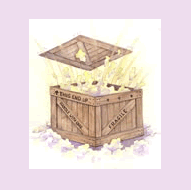| |
By
her own account, Anne Robertson was something of a fanatic.
Growing up in the American Baptist Church, she slid as far
over to the Christian Right as a young fundamentalist could
and spent much of her childhood convinced that she had God
pegged. Those people with different ideas about the divine
were obviously in need of enlightenment. She describes herself
during those days as “intolerant, religiously bigoted,
and so immersed in literature about the end times that I
had no use for the present.” She
wasn’t much better when, years and significant life-experiences
later, she saw God through a more liberal lens. Her judgment of
others still remained. If someone didn’t see things her way,
they obviously had made some grave theological miscalculations. Honest self-examination can result in wonderful things. For Anne
Robertson the result was a book called Blowing the Lid Off
the God-Box. Based on her own experiences of tamping God into a Robertson-made
container, she probes deeply into the way we close God in, limiting
the holy by the boundaries of our own conceptions. It
is good to have a God-box. It is “our experience of God
and our beliefs about who God is and how God behaves.” The
problem comes when we close up that box and clamp down the lid,
replacing a God of mystery and omnipresence with our own small
ideas about the divine. We create little gods molded by our own
thinking, and inevitably shut out others’ beliefs and experiences
of the sacred. “Perhaps if all sides realized that there
is always more to be learned, and that any time we try to reduce
the vast mystery of God to human words and formulae, we never will
have it quite right,” Robertson suggests, “perhaps
then we could settle down and learn from one another rather than
aimlessly wandering in the wilderness with no real place to call
home.” Looking
at the political and social landscape, Robertson sees that time
and again, we lay claim to a specific ideology, dig in
our heels and then insist that God has set up residence on our
plot. “We cannot trap God in a single ideology, social agenda
or political platform,” she writes. “Maybe if we could
remember that, we wouldn’t be so tempted to demonize the
other side.” In
this election year, with tempers hot and opinions unyielding,
we can easily
slam our God-box shut. More and more politics has
become intertwined with religious beliefs, with each side claiming
that God is in their camp. We look into our God-box and dismiss
anyone or any notion that doesn’t quite fit, disregarding
the fact that God can’t be confined. Robertson urges us to
open our box, stretching it far enough to glimpse God’s presence
on both sides. Perhaps in doing so we’ll begin to understand
that there are God-boxes in places we don’t even know exist. --Read
an excerpt
|



